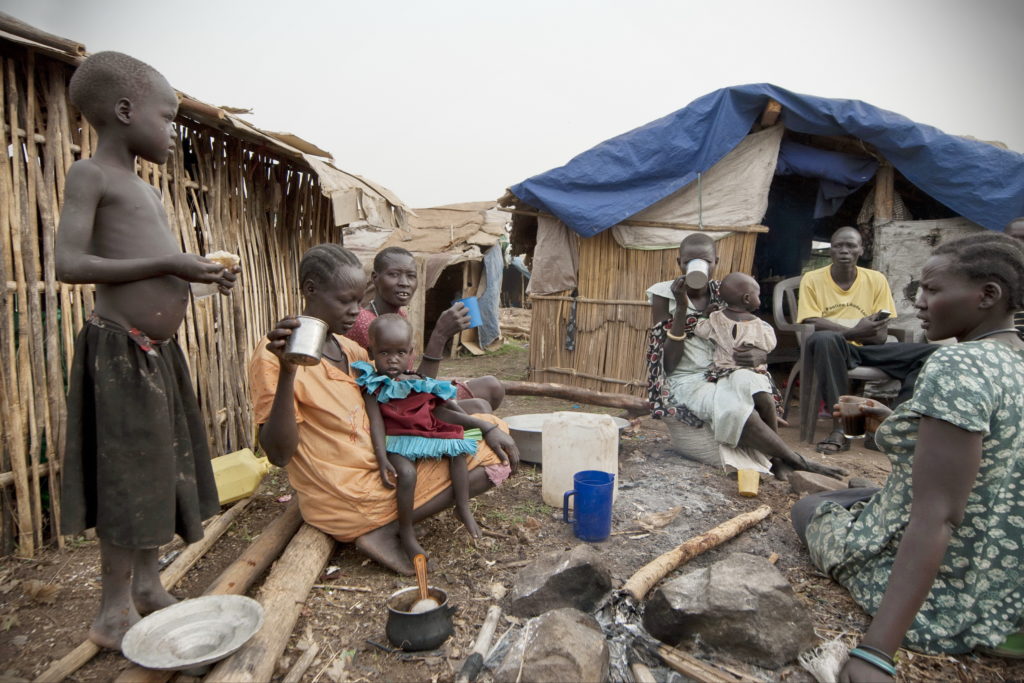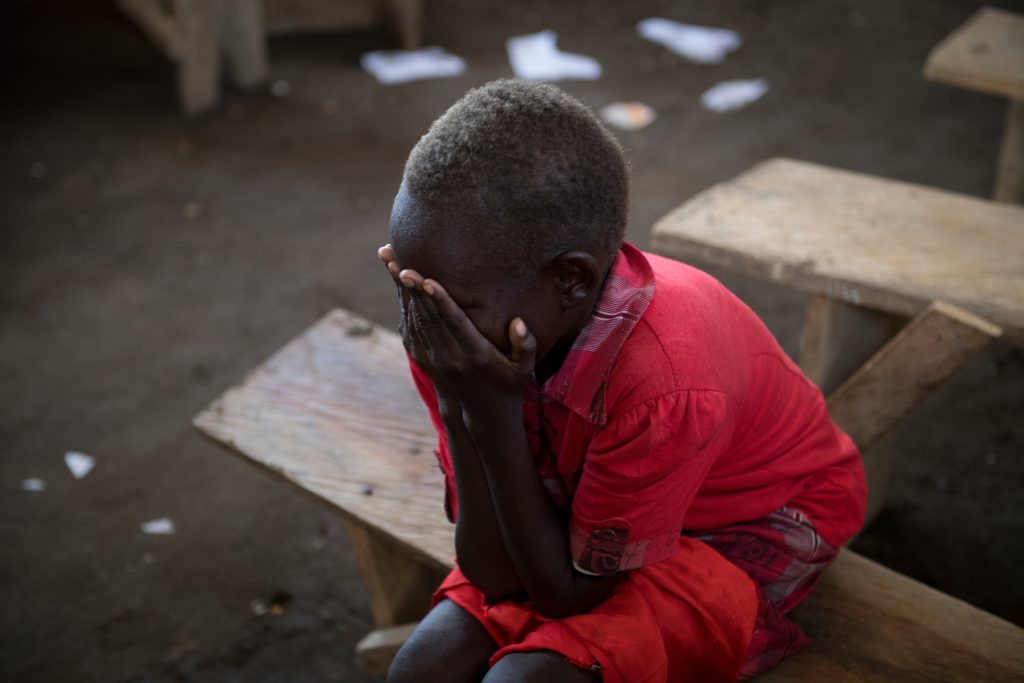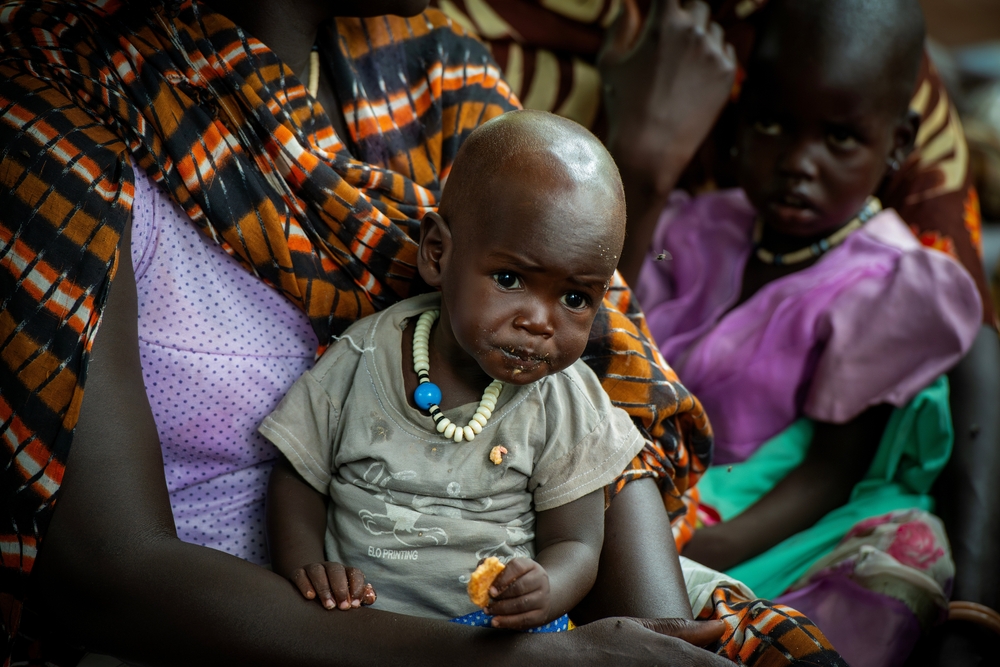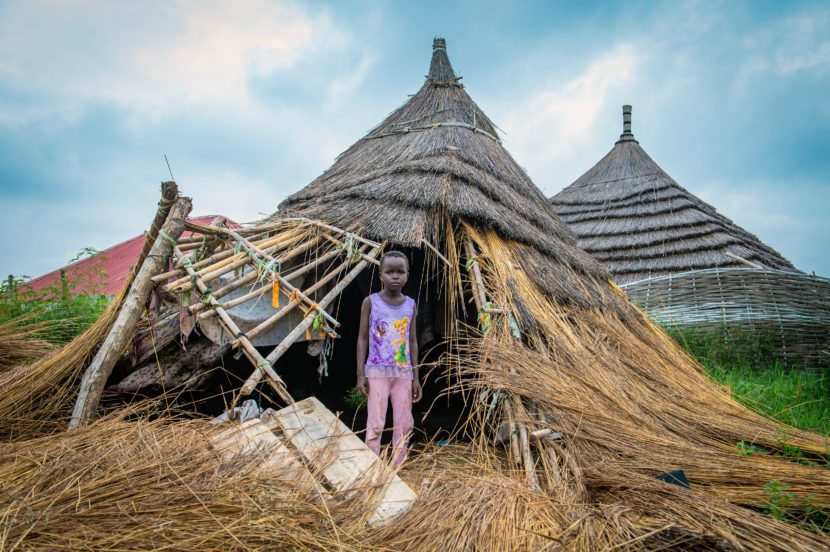South Sudan, independent since 2011, continues to be devastated by armed conflicts that severely infringe on children’s rights. Despite a peace agreement and ceasefire in 2020, intermittent clashes (including recent confrontations in early 2025) have caused a surge in civilian casualties and mass displacement. The country faces alarming levels of child soldier recruitment, conflict-related sexual violence, and malnutrition, often worsened by disrupted humanitarian aid and restricted access in conflict zones.
Renewed violence and its effects on children (since 2023)
Despite the 2020 ceasefire, armed clashes have resurged in several parts of South Sudan since 2023, disrupting fragile peace efforts. This renewed violence has displaced thousands, blocked humanitarian aid, and worsened food insecurity.
Children are among the most affected — facing hunger, disrupted services, and increased risk of recruitment by armed groups. With systems already weakened, the conflict continues to erode their access to safety, education, and basic care (UNICEF, 2025).
Displacement as a consequence of renewed conflict

The ongoing conflict in South Sudan has led to significant displacement of children, severely impacting their rights and well-being. According to recent reports, over 25,000 South Sudanese, including many children, have crossed the border in a single month to seek refuge in Sudan, a country also devastated by war (ONU Info, 2025). Many displaced children face dire conditions in refugee camps, where malnutrition and disease are rampant due to inadequate water supply and sanitation facilities (Kiir, 2025). In addition, education and healthcare services have been disrupted.
Child malnutrition in the context of conflict and displacement
South Sudan has been hit by a wave of malnutrition due to hostilities, displacement and other precarious living conditions. Clashes in regions like Upper Nile and along the Nile River have disrupted aid delivery and schooling, further destabilising environments vital for child protection, with humanitarian access increasingly restricted, as seen in Upper Nile, where aid for tens of thousands of malnourished children was halted.
In this climate, children are at higher risk of being coerced into armed groups, and the weakened response capacity of UNICEF, UNMISS, and NGOs makes reintegration and prevention efforts ever more urgent (Holland & Heinrich, 2025).
Current recruitment of child soldiers in South Sudan
Since the start of South Sudan’s conflict, the recruitment of child soldiers remains a serious violation of children’s rights, despite limited progress (ONU Info, 2022). Both armed groups and government forces have been responsible for these practices, in spite of warnings from the Committee on the Rights of the Child, calling on the government to honour the promises it made under international law (ONU Info, 2022).
These children are often torn from their families. Many lose access to school and are exposed to extreme violence (UNICEF, 2024). This leads to particularly alarming living conditions, as they are used not only as combatants, but also as carriers, messengers and cooks, exposing them to deep physical and psychological trauma (UNICEF, 2024).
In 2023, several parties involved in South Sudan’s conflict were documented committing grave violations against children, with at least 152 children recruited and used in hostilities, 32 abducted, and sexual violence reported against four girls. These figures, verified by the UN Secretary-General’s Annual Report on Children and Armed Conflict, reveal that, despite legal frameworks in place, forced recruitment remains persistent. Schools, once safe spaces, have been repeatedly occupied by armed groups. This blurs the line between civilian life and war (Hassan, 2024).
Conflict-related sexual violence against children
Sexual violence against children in South Sudan remains a devastating crisis. Human Rights Watch documented grave violations, including sexual violence, committed by various parties to the conflict (Hassan, 2023). Despite international attention, many girls and boys continue to suffer abuse, often in places meant to be safe, such as their homes or displacement camps.

According to the UN Mission in South Sudan (UNMISS), between January and March 2023, there were 14 documented cases of conflict-related sexual violence affecting civilians, including children. Given the stigma, fear, and limited access to reporting mechanisms, the actual number of cases is likely significantly higher (Hassan, 2023). Children who survive abuse are frequently shunned or blamed, pushing them into isolation and cutting them off from essential services like schooling and healthcare. The ongoing conflict and displacement in South Sudan make it even harder for children to find protection or access justice (Hassan, 2023).
However, more sustained funding, stronger law enforcement, and community engagement are urgently needed to protect children effectively and break the cycle of violence. The United Nations has called for enhanced efforts to prevent and respond to sexual violence, emphasizing the need for comprehensive strategies and accountability (UNMISS, 2025).
“We have no other choice. If we take the road, we get raped. If we go through the bush, we get raped. I was raped in the same place three times, along with other women. We chose not to take the road because we’d heard horrifying stories of women and girls being abducted and raped — but the same thing happened to us. There is no escape. They rape all of us.”
– A 30-year-old sexual abuse survivor from Koch County (OHCHR, 2019)
Government and international efforts to protect children
In the face of this ongoing tragedy, the South Sudanese government has begun to take steps to address the issue. It has ramped up its efforts to shield children from conflict through a series of coordinated initiatives. In September 2024, authorities co‑hosted the 3rd National Conference on the Protection of Children against Recruitment, highlighting great political determination. This gathering, held jointly with UN partners, assessed the Implementation of the 2020 Comprehensive Action Plan to end grave child rights violations (Mold, 2024).
By hosting the conference and committing publicly to change, the government sent a clear message: protecting children is not just a goal, it’s a priority. South Sudan’s Vice-President, Rebecca Nyandeng de Mabior, reminded everyone that these are not just numbers on a page. “Behind every statistic is a child whose dreams and future are at risk,” she said. The conference brought fresh momentum to the fight against child recruitment, but whether it leads to real, lasting change remains to be seen (Mold, 2024).
What could be done to improve the situation for children?
To improve the situation for children in South Sudan, any sustainable response must begin with addressing the root cause: ongoing armed conflict. Without a stable and lasting peace, efforts to end child recruitment, sexual violence, displacement, and malnutrition will remain limited in impact.
A durable solution requires:
- Strengthening the peace process and enforcing existing ceasefire agreements.
- Holding perpetrators of grave child rights violations accountable, including those involved in the recruitment of child soldiers and acts of sexual violence.
- Ensuring unrestricted humanitarian access to all regions, so that displaced and vulnerable children receive urgent food, medical care, and protection.
- Supporting child protection systems, including reintegration programs for former child soldiers and trauma care for survivors of violence.
- Investing in education and safe spaces to help restore normalcy and reduce children’s vulnerability to exploitation.

Humanitarian support — such as food, healthcare, and nutrition interventions — remains essential. But these efforts must go hand in hand with stronger political will, peacebuilding, and justice mechanisms that tackle the violence itself. The South Sudanese government must uphold its commitments to protect children, end the use of child soldiers, prevent sexual violence, and ensure access to aid across all regions.
Organisations like Humanium dedicate themselves daily to protecting children’s rights and providing essential support, from education to mental health care. True and lasting change requires both global awareness and local action. That’s why we invite you to support Humanium’s mission, whether by volunteering your time, making a donation, or sponsoring a child in need.
Written by Morgane Schmutz
References:
Action Against Hunger. (2025, February 07). South Sudan – Hunger Relief in Africa. Action Against Hunger. Retrieved from https://www.actionagainsthunger.org/location/africa/south-sudan/, accessed on May 27, 2025.
Amnesty International. (2025, April 10). They raped all of us: Sexual violence against women and girls in Sudan. Amnesty International. Retrieved from https://amnestyfr.cdn.prismic.io/amnestyfr/Z_eTJ-vxEdbNO1jg_Rapport_ViolencesSexuelles_Soudan_2025.pdf, accessed on June 5, 2025.
Berlanga, E. (2024, November 18). Soudan du Sud : les rapatriés fuyant la guerre et les enfants sont les plus durement touchés par la crise de la faim. UN News. Retrieved from https://news.un.org/fr/story/2024/11/1150636, accessed on June 6, 2025.
Hassan, T. (2023, November 28). World Report 2024: South Sudan. Human Rights Watch. Retrieved from https://www.hrw.org/world-report/2024/country-chapters/south-sudan?, accessed on June 6, 2025.
Hassan, T. (2024, January 26). World Report 2025: South Sudan. Human Rights Watch. Retrieved from https://www.hrw.org/world-report/2025/country-chapters/south-sudan?, accessed on June 6, 2025.
Holland, H., & Heinrich, M. (2025, May 8). South Sudan clashes block aid to 60000 malnourished children. Reuters. Retrieved from https://www.reuters.com/world/africa/south-sudan-clashes-block-aid-60000-malnourished-children-2025-05-08/, accessed on June 6, 2025.
Kiir, S. (2025, May 28). Soudan du Sud : un pays dévasté par la guerre. Médecins sans frontières. Retrieved from https://www.msf.fr/decryptages/soudan-du-sud-un-pays-devaste-par-la-guerre, accessed on May 28, 2025.
Le Devoir. (2024, July 10). Risque de famine au Soudan du Sud, alerte Save the Children. Le Devoir. Retrieved from https://www.ledevoir.com/monde/afrique/816264/risque-famine-soudan-sud-alerte-save-the-children, accessed on June 4, 2025.
Mold, F. (2024, September 19). Prevention of the recruitment of child soldiers tops the agenda at National Conference in South Sudan. United Nations Mission in South Sudan. Retrieved from https://unmiss.unmissions.org/prevention-recruitment-child-soldiers-tops-agenda-national-conference-south-sudan?, accessed on June 6, 2025.
OHCHR. (2019, 15 February). South Sudan: Brutal sexual violence persists in Northern Unity region – UN report. Office of the High Commissioner for Human Rights. Retrieved from https://www.ohchr.org/fr/2019/02/south-sudan-brutal-sexual-violence-persists-northern-unity-region-un-report, accedded on June 6, 2025.
ONU Info. (2022, September 02). Soudan du Sud : le Comité des droits de l’enfant préoccupé par l’enrôlement d’enfants par les groupes armés et par les forces gouvernementales. ONU Info. Retrieved from https://news.un.org/fr/story/2022/09/1126371, accessed on May 28, 2025.
ONU Info. (2025, May 21). En un mois, plus 25 000 Sud‑Soudanais ont fui pour se réfugier au Soudan en guerre. ONU Info. Retrieved from https://news.un.org/fr/story/2025/05/1155746, accessed on June 5, 2025.
Takpiny, B. (2025, February 18). South Sudan commits to end recruitment, use of child soldiers. Anadolu Ajansı. Retrieved from https://www.aa.com.tr/en/middle-east/south-sudan-commits-to-end-recruitment-use-of-child-soldiers/3486053, accessed on June 5, 2025.
UNICEF. (2024, February 12). Enfants Soldats. UNICEF. Retrieved from https://www.unicef.fr/convention-droits-enfants/protection/enfants-soldats/, accessed on June 2, 2025
UNICEF. (2025, February 12). Enfants soldats – quand la fuite réussit. UNICEF Actualités. Retrieved from https://www.unicef.ch/fr/actualites/blog/2025-02-12/enfants-soldats-quand-la-fuite-reussit, accessed on May 27, 2025.
UNICEF. (2025, May 08). Lifesaving humanitarian supply route cut in South Sudan, leaving malnourished children at risk. UNICEF South Sudan. Retrieved from https://www.unicef.org/southsudan/press-releases/lifesaving-humanitarian-supply-route-cut-south-sudan-leaving-malnourished-children, accessed on May 27, 2025.
UNMISS. (2025, April 17). Annual Brief on Violence Affecting Civilians – Human Rights Division United Nations Mission in South Sudan. Retrieved from https://www.un.org/sexualviolenceinconflict/report/annual-brief-on-violence-affecting-civilians-human-rights-division-united-nations-mission-in-south-sudan/, accessed on June 6, 2025.


